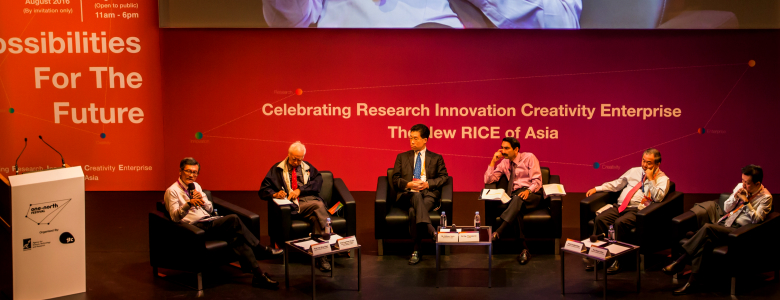The Technological Future of Singapore

Research, innovation and enterprise are the cornerstones of Singapore’s economy, said Deputy Prime Minister Mr Teo Chee Hean in his opening address at the one-north Festival, a five-day science and technology event held from 2-6 August, 2016.
He noted that the one-north hub was home to about 400 enterprises, more than 700 start-ups, 40 incubators and 16 public research institutes.
“This vibrant community of scientists, researchers and innovators from both the private and public sectors will nurture our innovators and entrepreneurs of tomorrow.”
Mr Teo, who is also the chairman of the National Research Foundation Board, said the one-north Festival was a “good platform for stakeholders to discuss the role science and innovation can play in the next phase of Singapore’s development.”
It was these very issues that were brought up during the Leaders in Science forum that kickstarted the festival, moderated by Dr Raj Thampuran, Managing Director of the Agency for Science, Technology and Research (A*STAR).
Panel members included Mr William Saito, Special Advisor of the Cabinet Office of the Government of Japan; Professor Lui Pao Chuen, Advisor of the National Research Foundation; Professor Tan Eng Chye, Deputy President and Provost of the National University of Singapore; Professor Freddy Boey, Deputy President and Provost of Nanyang Technological University; and Professor David Chan, Director of the Behavioural Sciences Institute at the Singapore Management University.
Embracing Interconnectedness
When asked about how public policy should best adapt to the technological challenges of the 21st century, Professor Lui Pao Chuen said that policymakers will need to start looking at issues and opportunities as interconnected systems instead of self-contained ones.
According to Professor Lui, this increasingly interconnected world also demands that policymakers think ‘horizontally,’ rather than ‘vertically’—Facebook and Uber are just two wildly successful examples of companies that built innovative new systems from technologies already present, he said.
Policymakers can learn from these companies and bring apparently unrelated functions together, instead of seeing them as the purview of different ministries, he said.
“The biggest gap right now is between economics, and science and technology. Both sides need to understand what’s going on with the other side, and this divide needs to be closed,” Professor Lui noted.
The Future of Education
Professor Freddy Boey shared his vision of education in the future, and how universities can no longer “go on looking in the rear view mirror.”
“I think the greatest challenge to universities is the technology itself. Instead of worrying about it, we should embrace it,” Professor Boey said.
“Never before in human history has it been so opportune for us to re-look learning because the same person, with the same brain, and with the same limited time, can learn two times better with new technology.”
The incorporation of technology into NTU’s curriculum has been promising so far — the university’s medical students already substitute traditional, stilted lectures with videos that they view before attending interactive seminars.
And some possible good news for students who dread exams: Professor Boey also pondered about how technology may one day, help to do away with exams via innovative solutions that track and grade the students’ progress as they learn.
The Changing Nature of How We Work
When asked about how the future will change the nature of work, Professor Tan Eng Chye said that professionals will need to stay ahead of the technological curve so as to remain competitive.
In the midst of increasing automation and the rising importance of big data, Professor Tan stated how it is “important to not just be users, but also to be able to bring extra value by leveraging on the technology that is available”.
He also proposed that quantitative reasoning and computational thinking should be included in the curriculum.
Such skills, coupled with the ability to apply them flexibly across various challenges, he said, would help people truly take advantage of the opportunities created by technology, instead of being left behind.
Building Resilience in Today’s Digital Age
Professor David Chan, while reflecting about Singapore’s Smart Nation initiative, provided a nuanced view that while technology can be harnessed to a country’s benefit, it was ultimately the values and resilience of its people that were the key to its success.
In a nation where masses of people are so dependent on technology, Professor Chan questioned if people would be able to adapt if the technology faltered, especially in times of crisis.
“The Smart Nation plan is ambitious and very good, but I think we need to be preventive, and not just inspirational. When everything is connected and one part of the system fails, will we be resilient enough to compensate for it?”
The Leaders in Science forum concluded with many interesting points for the audience to think about.
It also officially kicked off the inaugural one-north Festival, which was organised by the A*STAR, and JTC Corporation.
The Festival brought together a diverse group of leading scientists, innovators, media professionals and entrepreneurs from Singapore and beyond.
For the benefit of the public, the Festival also showcased various aspects of engineering, technology and media through workshops, exhibitions and open houses.
These opportunities allowed the public to celebrate research, innovation and enterprise, and to experience first-hand how they impact Singapore and the world — and perchance to glimpse the technological future ahead.
https://www.tech.gov.sg/media/technews/the-technological-future-of-singapore
